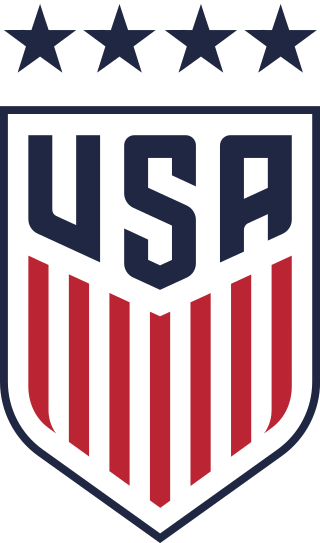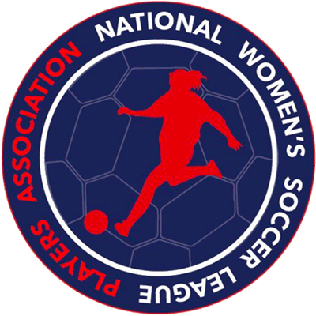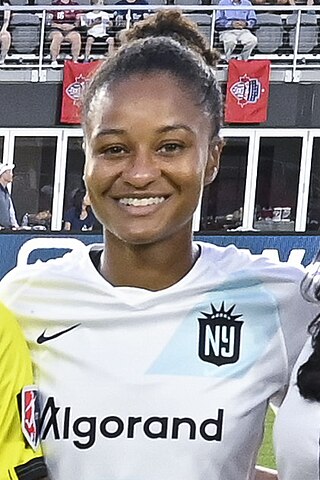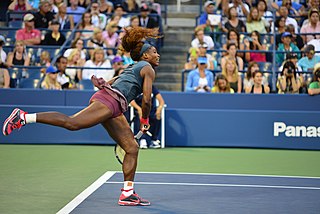
The United States Soccer Federation (USSF), commonly referred to as U.S. Soccer, is a 501(c)(3) nonprofit organization and the official governing body of the sport of soccer in the United States. Headquartered in Chicago, the federation is a full member of FIFA and governs American soccer at the international, professional, and amateur levels, including: the men's and women's national teams, Major League Soccer, National Women's Soccer League, youth organizations, beach soccer, futsal, Paralympic, and deaf national teams. U.S. Soccer sanctions referees and soccer tournaments for most soccer leagues in the United States. The U.S. Soccer Federation also administers and operates the U.S. Open Cup and the SheBelieves Cup.

The United States women's national soccer team (USWNT) represents the United States of America in international women's soccer. The team is governed by United States Soccer Federation and competes in CONCACAF.

The United States soccer league system is a series of professional and amateur soccer leagues based, in whole or in part, in the United States. Sometimes called the American soccer pyramid, teams and leagues are not linked by the system of promotion and relegation typical in soccer elsewhere. Instead, the United States Soccer Federation defines professional leagues in three levels, called divisions, with all other leagues sanctioned by the USSF not having an official designated level or division.
The U.S. National Soccer Team Players Association (USNSTPA) is the players union for the members of the United States men's national soccer team. Though the organization has existed since 1996, they rose to prominence within American soccer in late 2004 when their collective bargaining negotiations with the United States Soccer Federation (USSF) became public. At the time, the collective bargaining agreement had been expired for two years, and negotiations during that period hadn't resulted in a new agreement.

Rebecca Elizabeth Sauerbrunn is an American professional soccer player who plays as a center back for Portland Thorns FC of the National Women's Soccer League (NWSL) and the United States national team. She co-captained the national team with Carli Lloyd from 2016 to 2018 and was the captain of the team from 2021 to 2023.
Meghann Kay Burke is an attorney and executive director of the National Women's Soccer League Players Association (NWSLPA), the trade union for players in the NWSL, the top division of women's soccer in the United States. Burke led the NWSLPA to its first collective bargaining agreement in 2022.

Women's soccer in the United States has developed quite differently from men's soccer. Until the 1970s, organized women's soccer matches in the U.S. existed only on a limited basis. The U.S. is now regarded as one of the top countries in the world for women's soccer, and FIFA ranked its national team #1 in the world after its back-to-back Women's World Cup victory in 2015 and 2019.

The National Women's Soccer League (NWSL) is a professional women's soccer league at the top of the United States league system. Headquartered in New York City, it is owned by the teams and, until 2020, was under a management contract with the United States Soccer Federation.
The National Women's Soccer League (NWSL) federation players were players whose salaries for playing in the NWSL were paid for by their respective national federations from 2013 to 2021. American federation players were contracted to the United States Soccer Federation (USSF) and not to their respective NWSL clubs, whereas Canadian federation players were contracted directly to their respective NWSL clubs. Federation players were sometimes known as allocated players, allocation players, or subsidized players, which occasionally created confusion with players paid using NWSL allocation money, a mechanism introduced before the 2020 NWSL season.

Samantha June Mewis is an American former professional soccer player who played as a midfielder. Mewis is the editor-in-chief and podcast host of The Women's Game from Men in Blazers.
The 2015 National Women's Soccer League season was the third season of the National Women's Soccer League, the top division of women's soccer in the United States. Including the NWSL's two professional predecessors, Women's Professional Soccer (2009–2011) and the Women's United Soccer Association (2001–2003), it was the ninth overall season of FIFA and USSF-sanctioned top division women's soccer in the United States. The league was operated by the United States Soccer Federation and received major financial backing from that body. Further financial backing was provided by the Canadian Soccer Association and the Mexican Football Federation. All three national federations paid the league salaries of many of their respective national team members in an effort to nurture talent in those nations.

Starting in 2016, players for the United States women's national soccer team (USWNT) have engaged in a series of legal actions against the United States Soccer Federation (USSF). These legal actions detail the unequal treatment and compensation of the USWNT, as compared to the U.S. men's national soccer team (USMNT). The process of achieving equal pay and treatment started with a federal complaint submitted to the Equal Employment Opportunity Commission in 2016, with notable moments throughout 2017, 2019, 2020, and 2022. The fight for equal treatment and compensation has received widespread media attention, inspired legislative action in the U.S. Senate, and received fan support. The 2021 documentary film, LFG also details the story of the U.S. women's national soccer team and their fight for equal pay. A landmark equal pay agreement was reached in February 2022.

Stephen Malik is a Welsh-American businessman and sports owner who owns and is chairman of North Carolina FC of United Soccer League and North Carolina Courage of National Women's Soccer League. He also founded and was executive chairman of medical technology company Medfusion, and was a member of the United States Soccer Federation board of directors from March 2017 to March 2019 and February 2020 to February 2021.

The National Women's Soccer League Players Association is the officially recognized union of players in the National Women's Soccer League (NWSL).

Imani Michelle Dorsey is an American professional soccer player who currently plays as a defender for the Utah Royals in the National Women's Soccer League (NWSL).

This is a timeline of the gender pay gap in sports, spanning from the 20th century to the 21st century. It includes the major events that resulted in the equal pay of male and female athletes in varying sports across the world. The first major event that got publicity about the gender pay gap in sports was with Billie Jean King at the Italian Open in 1970. The passing of Title IX in 1972 generated a wave of female participation in athletics, as well as increased funding for female sports. Following their win of the 2015 FIFA World Cup, the US Women's Soccer Team highlighted gender discrimination in sport and brought about another movement towards achieving equal pay in sports.
The 2015 Australia women's national soccer team strike was a two-month long strike by the players of the Australia women's national soccer team. Supported by the Professional Footballers Australia unions, the players successfully won improvements in pay and working conditions. It was the first time in history that an Australian national sporting team had gone on strike.
Professional women's association football players have organized to dispute several issues specific to the sport, such as disparities in compensation compared to men's teams; insufficient pay to compete with other women's teams; unfair or exclusionary financial terms of federation business agreements involving the team; a lack of minimum standards in facilities and treatment, especially compared to men's teams in the same federation, league, or club; reports of systemic gender-related abuse of players, including sexual abuse being ignored by league or federation officials; and a lack of benefits specific to women such as paid leave for pregnancy and maternity, and child care coverage.
The Yates Report, officially titled Report of the Independent Investigation to the U.S. Soccer Federation Concerning Allegations of Abusive Behavior and Sexual Misconduct in Women's Professional Soccer, is the official report documenting the findings and conclusions concerning abusive behavior and sexual misconduct in women's professional soccer, with a focus on the National Women's Soccer League (NWSL). The 173-page report was publicly released by the United States Soccer Federation (USSF) on October 3, 2022. It is named for Sally Yates, the King & Spalding partner who led the investigation who had previously served as acting United States Attorney General.











